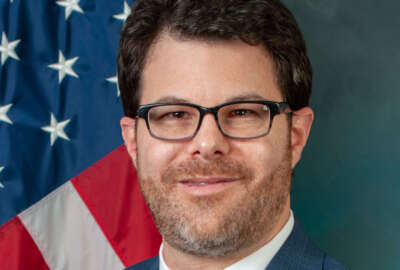
Judiciary branch urged to tighten up oversight
Judges are suppose to be above the law. But even in the federal judicial branch, ethical and legal transgressions occur. The Government Accountability Office has...
Best listening experience is on Chrome, Firefox or Safari. Subscribe to Federal Drive’s daily audio interviews on Apple Podcasts or PodcastOne.
Judges are suppose to be above the law. But even in the federal judicial branch, ethical and legal transgressions occur. The Government Accountability Office has found that the judiciary doesn’t follow best practices for addressing waste, fraud and abuse. To get the details, the Federal Drive with Tom Temin spoke with GAO’s Director of Information and Cybersecurity, Carol Harris.
Interview transcript:
Carol Harris: So we don’t do a whole lot of judiciary branch work. I mean, we do some but that that’s not the bulk of the work that we do. But the requests really came from Hank Johnson, the chairman of the Subcommittee on the Courts, for the House Judiciary Committee, and then Mr. Connolly, the the chairman of the Subcommittee on Government Operations, and so they were the ones that wanted us to take a look at the federal judiciary’s fraud, waste and abuse policies, and look at whether or not they aligned to best practice. So that was really the genesis for our work.
Eric White: Okay, so let’s break down what you all found, that every other agency seems to have an inspector general that’s part of the agency, but doesn’t necessarily report to the head honcho. But you all found that that’s not the case in the federal judiciary system.
Carol Harris: Yeah, so the judiciary branch does not have an inspector general. And so that is one of the main findings that we did have where we took a look at independence. I mean, that’s the bedrock of any healthy fraud, waste and abuse program. And we did not find that their policies ensure independence in all investigations for their fraud, waste and abuse program. So that was critical. I mean, I will say that to their credit … well, let me take a step back. So the Administrative Office of the Courts, they serve the central support entity for the judicial branch. And they provide a broad range of services from like financial, technology, legislative and other like program support, and they are the ones that are responsible for overseeing the fraud, waste and abuse program. And quite frankly, the management of the program is very decentralized. So to their credit, to the administrative office’s credit, they have policies that state that the subject of an allegation is prohibited from being involved in conducting or overseeing that investigation. So that addresses one aspect of independence. But there are, of course, other structural and familiarity threats that exist. So for example, there is nothing that’s documented that prohibits the subjects of — well, actually, I should say, allegations are referred to the judicial branch component from which they originated — So there’s nothing documented that says that the subjects of the allegations cannot be assigned to investigate themselves. There’s also nothing documented in policy that prohibits individuals from being assigned to investigate their supervisors, or any employees with whom they have a close relationship. So those were independence issues that we identified in their program. And that’s why, when you take a look at the other parts of the government, we do have IGs, because they’re those entities that sit outside of the reporting structure for that very reason.
Eric White: Yeah, the referral process is what struck me; It seems as if it’s all kind of hanging by the honor system. And I know I’m not taking anything away from federal judiciary experts, but you do kind of need something in ink saying whether or not who can be responsible for what investigation and so forth, right?
Carol Harris: Absolutely. I mean, right now, what happens is, the administrative office, they receive the complaints, and then they coordinate and refer those allegations to the organization about which the complaint is being made. And yeah, without those documented policies, who’s to say that the subject of the complaint won’t be the one that is performing the investigation. That’s a major issue. And we also identified that not all of the judicial components within the court have documented procedures for addressing these fraud, waste and abuse allegations. So we know that the administrative office, they have defined procedures that their investigators are to use, but there is no such requirement for the courts, as well as the Federal Public Defender Organizations. So that also leads to inconsistency in the handling of these types of allegations across the Judicial branch. So that was another major finding of ours.
Eric White: And I don’t need you to cite any specific cases or anything like that. But when it comes to waste, fraud and abuse at a district court, what does that necessarily entail? I’ve read a ton of IG reports. So I get “we’re spending too much on this program,” or “where’s this money going?” But what can happen at a district court, actually?
Carol Harris: Well, that’s a great question. The whole reason why the fraud waste and abuse program is in place is to ensure that the judges and the judiciary staff are held responsible for their conduct as government officials, in addition to the management of public resources. So it’s ensuring that there is that level of accountability to make sure that everyone is acting appropriately,
Eric White: You already laid out one of the main obvious recommendations, which is, hey, why don’t we write up some policies? What were some of the other recommendations that you all made?
Carol Harris: Well, we also made recommendations related to their procedures themselves in their fraud, waste and abuse program that we felt lacked some sufficient detail on how to conduct these investigations and how to track the allegation data. So for example, they have procedures that specify interviews are to be conducted as part of this investigative process. But those procedures don’t describe where and how interviews are to be documented, or how evidence is collected, and how the chain of custody is preserved, among other things. So we wanted them to have their procedures more fleshed out. And we also recommended that they have more effective methods for storing the allegation data, so that they can have more effective analysis across the data to identify any trends or patterns that could be used to improve the judiciary branch’s fraud, waste, and abuse prevention and investigative efforts.
Eric White: As an experienced federal auditor yourself, maybe that’s the kind of thing that we don’t really think of, the details when it comes to doing an investigation into waste, fraud and abuse. Can you just expound a little bit about how important those little details such as who’s allowed to do an interview and where interviews can take place? How important are those during an audit?
Carol Harris: Oh, it’s extremely important. You need to have that record be comprehensive and complete. Because if you have holes in it, then that draws into question the audit itself. And then also, just from a macro level, you want to make sure that you’re able to identify trends and patterns across these audits. So you want to make sure that the information you have is consistent and standard across these audits to make and draw those comparisons.
Eric White: In this particular audit, did you hear anything from federal judiciary members about, did they seem open to changing and making things a little more structured?
Carol Harris: Yeah, so we made eight recommendations. And the Administrative Office did say that they intended to consider the recommendations while they work to evaluate ways to further develop their fraud, waste and abuse program. So they did not agree or disagree with the recommendations. But I take from that statement that they are open to making positive changes, based on our findings.
Eric White: Yeah. And after all, it’s where law and order is produced. They’re gonna need some law in order to keep themselves clean, right?
Carol Harris: Absolutely, yes, they have the critical responsibility for ensuring the fair and swift administration of justice. So having that fraud, waste and abuse program be comprehensive and consistent with best practice is essential to make sure that that administration of justice is solid.
Copyright © 2025 Federal News Network. All rights reserved. This website is not intended for users located within the European Economic Area.
Tom Temin is host of the Federal Drive and has been providing insight on federal technology and management issues for more than 30 years.
Follow @tteminWFED





